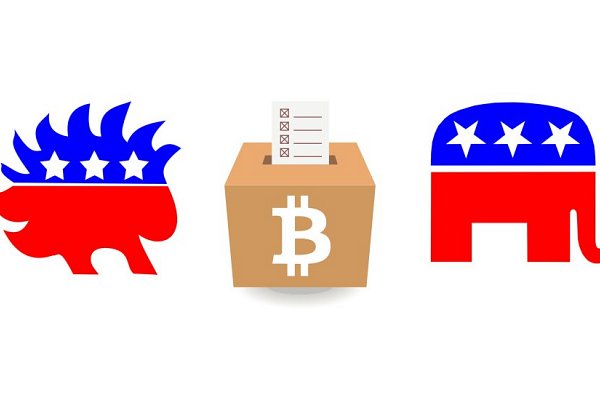Review: "The Politics of Bitcoin" Offers a Flawed and Misleading Partisan View

David Golumbia, an assistant professor in the Department of English at Virginia Commonwealth University, an aspiring political pundit, and the author of the recently published book, The Politics of Bitcoin: Software as Right-Wing Extremism, denounces Bitcoin in a recent blog post titled Trump, Clinton, and the Electoral Politics of Bitcoin.
“[What] concerns me about Bitcoin is how it contributes to the spread of deeply right-wing ideas in economics and political philosophy without those right-wing associations being made at all explicit,” says Golumbia, adding that the freedom and democratization offered by distributed ledger technology, able to resist interference by central authorities, are actually extreme right-wing concepts.
It is, of course, sad and disturbing to realize that aspirations to freedom are seen as right-wing extremism by certain sectors of contemporary “culture.” Golumbia’s book is promoted as “new scholarship” by the publisher — if that’s new scholarship, I’ll take old-fashioned authentic scholarship anytime.
According to Golumbia, the politics of Bitcoin and the blockchain are intersecting with the current U.S. presidential election. “There is certainly a fair amount of support for Trump among Bitcoin enthusiasts,” says Golumbia. “I do think that there are connections between Bitcoin and Trump.”
And where are those alleged connections? Throughout the vibrant, creative internet communities that fuel the development and deployment of distributed ledgers, along with many of the empowering technologies that are emerging, according to Golumbia.
“[The] kinds of false, angry, other-targeting ideologies on which the Trump phenomenon depends can be readily found in all the kinds of online communities that create and promote the frightening range of right-wing political action we see everywhere today,” says Golumbia in the blog post. “We should be very worried about Trump, and we should be worried about how Bitcoin and other parts of online discourse feed the hate and studied ignorance that make so many people support him.”
The book doesn’t mention Trump, but is explicit in condemning the Libertarian (or cyber-Libertarian) aspiration to personal autonomy, self-ownership and freedom — as much freedom as possible — from the power, greed and control freakery of overreaching central authorities.
“[In] the name of [Bitcoin], extremist ideas were gaining far more traction than they previously had outside of the extremist literature to which they had largely been confined,” says the author. “These ideas are not simply heterodox or contrarian: They are pieces of a holistic worldview that have been deliberately developed and promulgated by right-wing ideologues.”
This is not to say that Golumbia’s book isn’t well written. It is, in fact, a masterpiece of sophistry that carefully builds up subtly constructed distortions of simple concepts like “freedom” and “control,” in the hope of persuading the reader that real freedom can only come from a “benevolent” Big Brother that controls each and every aspect of life from the cradle to the grave. Sounds absurd? Sure it is, like those funny mathematical “demonstrations” that prove 1 equals 0.
Of course, one can’t assume that all readers are stupid and totally ignorant of facts. Therefore, Golumbia is forced to concede that not all Bitcoin enthusiasts are extreme right-wingers. “I am sometimes asked to account for Bitcoin enthusiasm among those with explicitly left-wing politics,” he acknowledges in the book. But Golumbia finds it hard to see how the “minority” of non-right-wing Bitcoin enthusiasts can resist “the political values that are very literally coded into the software itself.”
In the post, Golumbia vents his frustration at the growing Bitcoin enthusiasm from the mainstream left. In the video of the Connectivity session at the Clinton Foundation’s Clinton Global Initiative 2016 conference, two speakers — former special assistant to President Obama, Jamie Smith, now Global Chief Communications Officer of the Bitfury Group, and Peruvian economist, Hernando de Soto — talk about “the tantalizing future of the blockchain” (around minute 32). Golumbia seems especially upset that De Soto is praised not only by George H.W. Bush and Ronald Reagan, but also by Hillary and Bill Clinton (who called De Soto “the world’s greatest living economist,”) and denounces the Clintons as “left neoliberals.” Part of Golumbia’s full-on attack is based on “how easily and how transparently [Bitcoin] fits into the shift toward the right we see in so many places today.”
In a Twitter exchange with another political pundit, with whom this writer has had many disagreements and intense exchanges over the years, Golumbia extends his condemnation to all sorts of emerging, disruptive and empowering technologies. It’s difficult to escape the conclusion that Golumbia’s opposition to Bitcoin and its associated technologies has its roots in a preconceived and flawed partisan position.
The post Review: “The Politics of Bitcoin” Offers a Flawed and Misleading Partisan View appeared first on Bitcoin Magazine.


